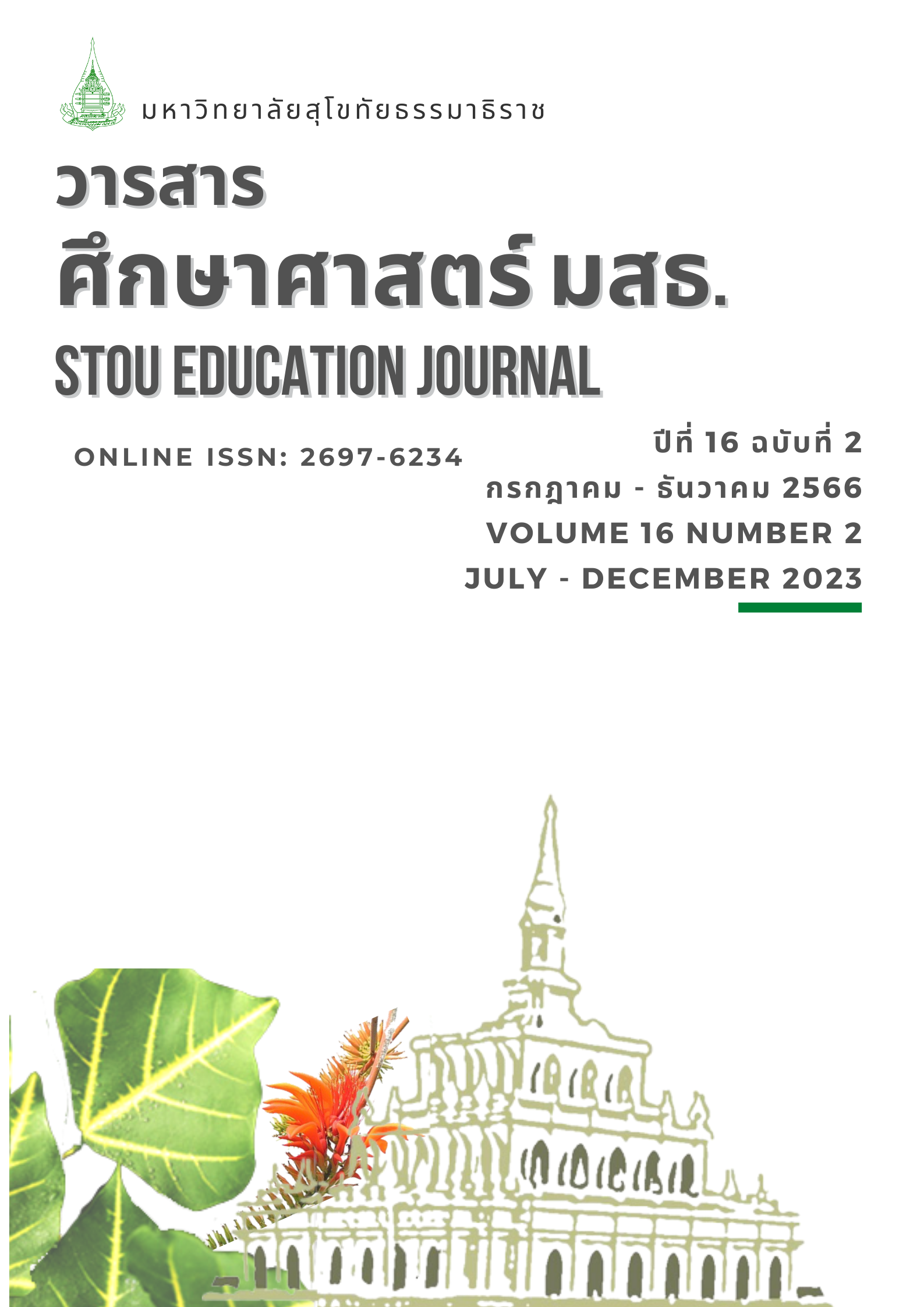A Needs Assessment in Online Learning for Students of School of Educational Studies in Sukhothai Thammathirat Open University
Main Article Content
Abstract
The purpose of this research was to assess the needs for online learning of students in the School of Educational Studies, Sukhothai Thammathirat Open University (STOU). The research sample consisted of 400 undergraduate and graduate students of the School of Educational Studies, STOU, obtained by stratified random sampling. The research tool was a 5-level rating scale questionnaire of dual response type on the needs for online learning of students of the School of Educational Studies, STOU. It had IOC indices of 0.67 - 1.00, discrimination indices of 0.60 - 0.78, and overall reliability in terms of alpha coefficient of 0.97. The data were analyzed using the mean, standard deviation, and PNImodified needs index. The results showed that the needs for online learning of students in the School of Educational Studies, STOU after being prioritized with the PNImodified needs index were as follows: the first ranked need was that for university support (PNImodified = .198), followed by that for students (PNImodified = .109), that for technology (PNImodified = .083), that for measurement and evaluation (PNImodified = .082), that for learning process (PNImodified = .067) and that for instructors (PNImodified = .061), respectively.
Article Details
References
ขรรค์ชัย คงเสน่ห์. (2546). พัฒนาการและทิศทางของ e-learning ในประเทศไทย: รายงานการวิจัย. ศูนย์เทคโนโลยีทางการศึกษา.
จินตวีร์ คล้ายสังข์. (2554). อีเลิร์นนิงเว็บไซต์ & คอร์สแวร์: ปัจจุบันและทิศทางในอนาคต (E-Learning Website & Courseware: Current and Future Trends). ใน เอกสารประกอบการประชุมวิชาการระดับชาติ (Proceeding) ด้านอีเลิร์นนิง : Open Learning - Open the World. สำนักงานคณะกรรมการการอุดมศึกษา.
นิตยา มณีวงศ์. (2564). ศึกษาพฤติกรรมและปัจจัยความสำเร็จการเรียนออนไลน์ แอปพลิเคชันไลน์ ในช่วงวิกฤต COVID 19.
https://edujournal.bsru.ac.th/storage/1770/13นิตยา.pdf
พชร ลิ่มรัตนมงคล และจิรัชฌา วิเชียรปัญญา (2556). ปัจจัยแห่งความสำเร็จของการเรียนออนไลน์ของผู้เรียนโครงการมหาวิทยาลัยไซเบอร์ไทย. https://rilj.rsu.ac.th/journal/8/article/18
พงศธร สิทธิจันทร์, อนุสรา นิลวัลย์, และสมิตา กลิ่นพงศ์. (2564). ทัศนคติต่อการเรียนออนไลน์ของนักเรียน ชั้นมัธยมศึกษาปีที่ 6 จังหวัดจันทบุรี ในช่วงการแพร่ระบาดโรคโควิด-19. การประชมุผลงานการวิจัย และวิชาการ นวัตกรรมธุรกิจและการเป็นผู้ประกอบการ, 6(1), 358-378.
พนิดา หนูทวี. (2560). ความต้องการในการใช้งาน e-learning ในการเรียนการสอนของนักศึกษาและอาจารย์ ระดับมหาวิทยาลัย. https://www.thonburi-u.ac.th/journal/Document/11-24/Journal11_24_3.pdf
ภูษิมา ภิญโญสินวัฒน์. (2563). จัดการเรียนการสอนอย่างไรในสถานการณ์โควิด-19: จากบทเรียนต่างประเทศสู่การจัดการเรียนรู้ของไทย. https://tdri.or.th/2020/05/examples-of-teaching-and-learning-in-covid-19-pandemic/
วัฒนพร จตุรานนท์, โสภี ชาญเชิงยุทธชัย, ศศิชญา แก่นสาร, และรัฐพร ปานมณี. (2563). การศึกษาพฤติกรรมการเรียนออนไลน์และความพึงพอใจที่มีต่อการจัดการเรียนรู้ภาษาจีนผ่านระบบออนไลน์ ของนิสิตหลักสูตรการศึกษาบัณฑิต สาขาภาษาจีน คณะศึกษาศาสตร์ มหาวิทยาลัยบูรพา ภาคการศึกษาฤดูร้อน
ปีการศึกษา 2562 ตามมาตรการและการเฝ้าระวังการระบาดของโรคไวรัสโคโรนา 2019. วารสารวิชาการภาษาและวัฒนธรรมจีน มหาวิทยาลัยหัวเฉียวเฉลิมพระเกียรติ, 7(2), 291-310.
สุรชาติ พุทธิมา และชโรชีนีย์ ชัยมินทร์. (2564). พฤติกรรมการเรียนแบบออนไลน์และความคิดเห็นที่มีต่อการเรียนการสอนแบบออนไลน์ ของนักศึกษาหลักสูตรศิลปศาสตรบัณฑิต สาขาวิชาสารสนเทศศาสตร์ มหาวิทยาลัยราชภัฏเชียงใหม่ ภายใต้สถานการณ์การระบาดของโรค COVID-19. http://www.chefile.cmru.ac.th/curriculum/2564/human/human_curriculum12/SAR4/KPI4.1/4.1-1-32(1).pdf
สุวิมล ว่องวาณิช. (2558). การวิจัยประเมินความต้องการจำเป็น. พิมพ์ครั้งที่ 3. สำนักพิมพ์แห่งจุฬาลงกรณ์มหาวิทยาลัย.
Elumalai, K.V., Sankar, J.P., Kalaichelvi, R., John, J.A., Menon, N., Alqahtani, M.S., & Abumelha, M.A. (2020). Factors affecting the quality of E-Learning during the COVID-19 pandemic from the perspective of higher education students. Journal of Information Technology Education: Research, 19, 731-753.
Roy, R., & Al-Absy, M. S. M. (2022). Impact of critical factors on the effectiveness of online learning. Sustainability, 14(21), 14073. https://doi.org/10.3390/su142114073
Saleem, F., AlNasrallah, W., Malik, M. I., & Rehman, S. U. (2022). Factors affecting the quality of online learning during COVID-19: Evidence from a developing economy. Frontiers in Education, 7, 13-13. https://doi.org/10.3389/feduc.2022.847571


